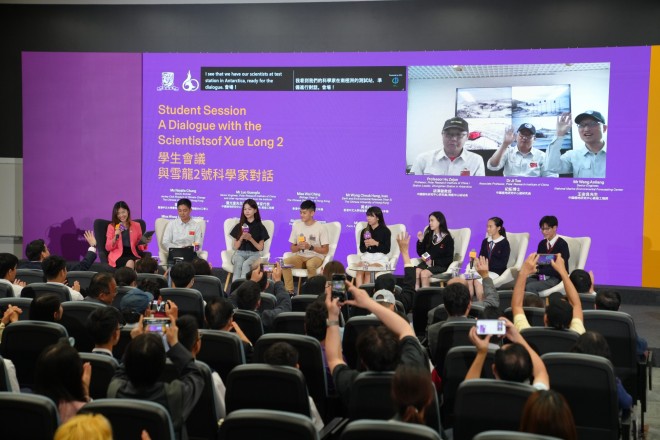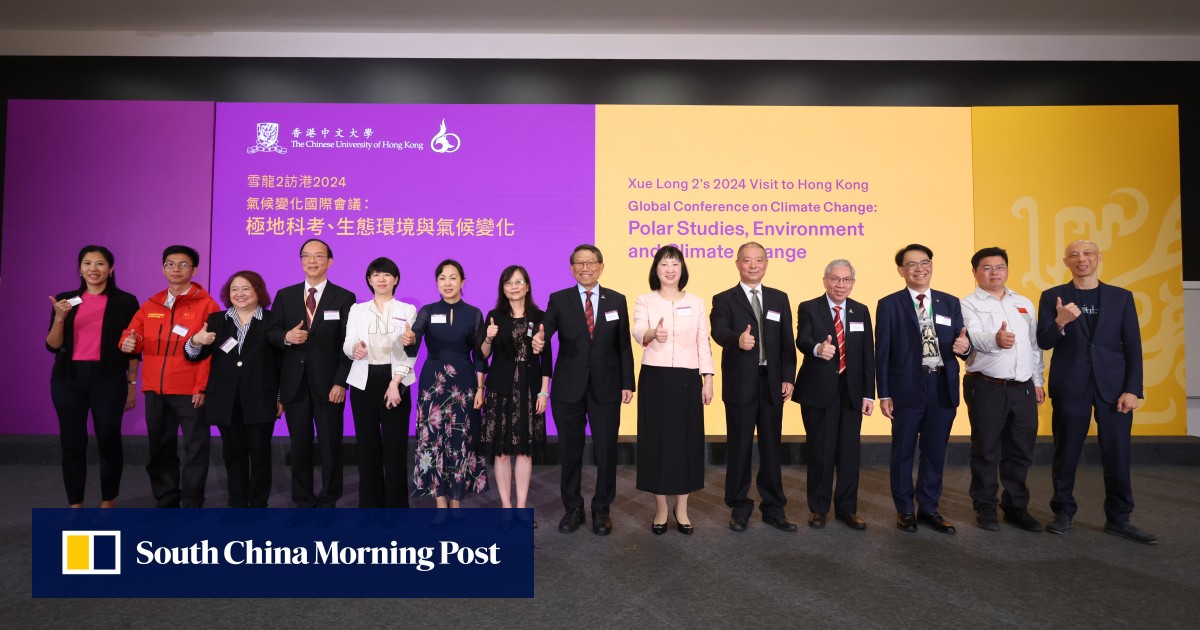[The content of this article has been produced by our advertising partner.]
Antarctica, a crucial climate change indicator, plays a significant role in Earth’s climate and ocean systems. It influences sea level rise and the rate of regional and global climate change. Research on Antarctica offers vital insights into past and present climate patterns, aids in predicting future climate scenarios, and guides the development of policies and strategies to mitigate climate change impacts.
China has made substantial contributions to global climate change research on the Antarctic ecosystem. Its first domestically built polar research two-way icebreaker, Xue Long (snow dragon) 2, recently completed a six-month mission, during which a new scientific station was established along the Ross Sea’s coastal areas.
CUHK, one of Asia’s leading research-focused universities, has been at the forefront of studying the impacts of climate change and sustainability worldwide. It established the Jockey Club Museum of Climate Change in 2013, the world’s first museum dedicated to climate change. In recognition of its research contributions, CUHK was the exclusive academic co-host for a series of activities commemorating Xue Long 2’s visit.
To align with Xue Long 2’s five-day stay in Hong Kong, CUHK co-organised a conference at the Yasumoto International Academic Park in the CUHK campus. The event was held in collaboration with the United Nations Sustainable Development Solutions Network (Hong Kong Chapter), the Jockey Club Museum of Climate Change, and the Polar Research Institute of Hong Kong.
The conference served as a dynamic platform for collaboration, knowledge exchange, and solution-oriented discussions among over 2,000 participants from around the world. These included scientists, researchers, academics, policymakers, industry leaders, students, and community representatives. Guided by a multidisciplinary approach and a shared goal to inspire global solutions to climate change, attendees delved into the latest ideas and findings in polar studies and shared insights on climate change, the environment, and the connection between polar regions and the global community.
Staunch support
The opening ceremony was graced by several distinguished guests including Chen Danhong, Director-General of the Department of International Cooperation, Ministry of Natural Resources, People’s Republic of China; Michelle Li Mei-sheung, Permanent Secretary for Education, HKSAR Government; Wu Cheng, Deputy Director-General, Department of Educational, Scientific and Technological Affairs, Liaison Office of the Central People’s Government in the HKSAR; Ma Fung-kwok, Chairman, Organising Committee for the Xue Long 2’s visit to Hong Kong; and Professor Ho Kin-chung, Chairman, Executive Committee for the Xue Long 2’s visit to Hong Kong.
Professor Rocky S. Tuan, Vice-Chancellor and President of CUHK, welcomed the guests and underscored CUHK’s commitment to bolster national efforts in climate change mitigation and marine resource protection.
Echoing his sentiment, Chen highlighted China’s commitment to combat climate change through the promotion of green energy and the construction of an ecological civilisation.

Ma noted that the visit of Xue Long 2 to Hong Kong, along with the interdisciplinary international academic conference hosted by CUHK, sparked scientific and technological innovation among Hong Kong’s youth. It also paved the way for the city to strengthen scientific research cooperation with the mainland and globally.
Knowledge exchange
The international conference brought together leading scientists from diverse fields such as oceanography, marine biology, astronomy, glaciology, and engineering, all of whom have a long-standing involvement in polar research. They were joined by academics and experts from other disciplines, including architecture, design research, education, and resource management.
Dr Zhang Beichen, Deputy Director of the Polar Research Institute of China, delivered a keynote address at the conference, providing an extensive update on China’s Antarctic research efforts and future plans.
In an atmosphere of open discussion and enthusiastic participation, the conference facilitated the exchange of insights and knowledge about the significant impact of climate change on the global economy, societal balance, and ecology through presentations, panel discussions, and breakout sessions. Experts shared their research findings and practical experiences in their respective fields, engaged in vibrant dialogues, forged cross-disciplinary connections, and proposed mutually interesting research projects.
The participants acknowledged the polar regions as both the driver and indicator of climate change. To counteract the adverse effects of climate change, they concurred on the necessity to bolster polar scientific research, foster interdisciplinary collaboration, and propel international mega polar science programmes. More importantly, engaging the next generation is the key.
Galvanise the next generation

On the conference’s second day, over 330 students from CUHK and various Hong Kong schools had the unique chance to learn about Antarctic life and research through interaction with scientists working at China’s polar research centre.
CUHK hosted an engaging scientist-student dialogue session, both in-person and online, to deepen local students’ understanding of China’s polar research achievements.
The audience was visibly fascinated and amused during this compelling dialogue, which included Luo Guangfu, a Senior Engineer at the Polar Research Institute of China. Representatives from the Zhongshan Station base in East Antarctica participated via Zoom. The dialogue was facilitated by Natalie Chung, a Hong Kong-born climate advocate, social entrepreneur, and the inaugural ‘MoCC Scholar’ of CUHK’s Museum of Climate Change, who has herself been on a polar expedition.

The students’ multi-perspective thinking was evident in their questions about life on the distant frozen continent. One student asked about the Southern lights over the Antarctic, while another inquired about unique wildlife species living under extreme weather conditions. A third questioned how scientists adapt to Antarctica’s harsh weather and its impact on their wellbeing.
Dr Ji Tuo, a scientist at Zhongshan station, said, “It depends on whether you are conducting scientific missions outside the station. But it is clear that here, you experience both faces of the Antarctic: its gentleness, but also its cruelty.”
When asked about his most significant takeaway from years of working on the Xue Long 2, Luo said, “For us, the biggest lesson is the importance of teamwork.” He looked out at the crowd, adding, “In the face of nature, we are infinitesimal; yet when we are a team, we can achieve things in the natural world.”
Wai Ching, a CUHK Science Faculty student, found the dialogue enlightening, especially regarding Xue Long 2’s polar science research and future goals. She expressed her enthusiasm to apply her knowledge and actively participate in climate change campaigns.

